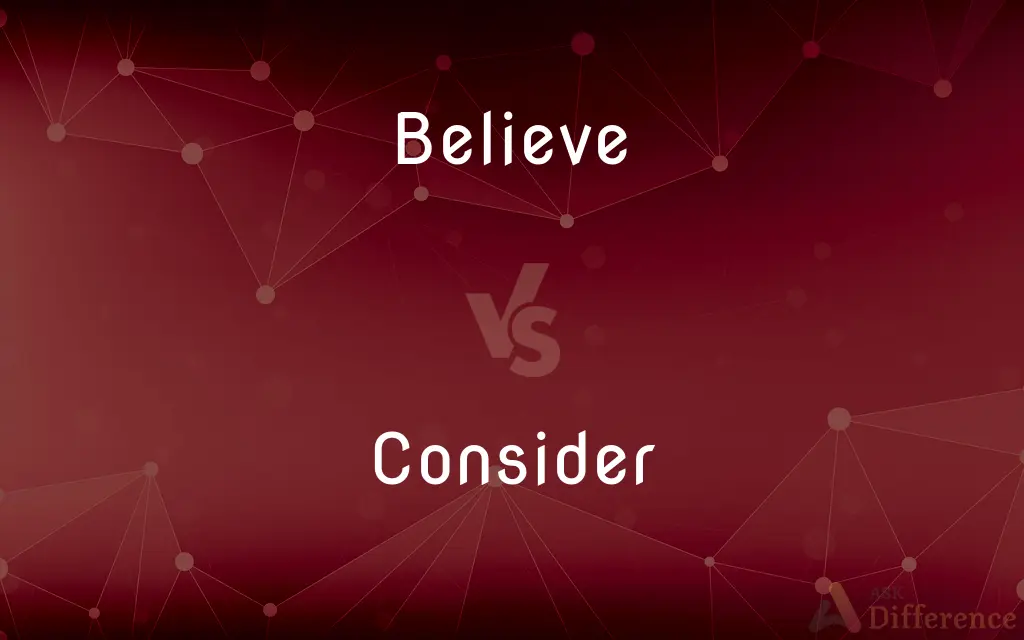Believe vs. Consider — What's the Difference?
By Tayyaba Rehman & Fiza Rafique — Updated on March 24, 2024
Believe involves accepting something as true, often without evidence, while consider means to think carefully about something, weighing options or evidence.

Difference Between Believe and Consider
Table of Contents
ADVERTISEMENT
Key Differences
Believing implies a conviction or acceptance of truth, which can stem from faith, trust, or confidence in something or someone, without the need for empirical evidence. On the other hand, considering involves a deliberate process of thinking about something carefully, often involving analysis and evaluation of evidence or options.
While belief is more about an internal feeling of certainty towards facts, ideas, or doctrines, considering is an intellectual process that involves contemplation and reflection, often leading to a conclusion or decision based on reasoning.
Beliefs can be deeply personal and are often influenced by cultural, religious, or personal experiences. In contrast, considering is a more neutral and objective approach that is used in decision-making processes, problem-solving, and analytical thinking.
Believing often requires a level of commitment to the truth of a statement or value of an idea, and it can shape one's perceptions and actions. Conversely, considering is a more flexible and open-ended process that allows for multiple perspectives and outcomes, without requiring an emotional or ideological commitment.
The act of believing can lead to a sense of identity and belonging, as shared beliefs create communal bonds. Considering, however, is more about engaging with different possibilities and does not necessarily lead to a fixed stance or group identity.
ADVERTISEMENT
Comparison Chart
Nature
Emotional or psychological acceptance.
Intellectual evaluation.
Requirement
Faith or trust, without needing proof.
Deliberation and weighing of evidence.
Outcome
A personal conviction or stance.
A reasoned conclusion or decision.
Influence
Often influenced by personal or cultural factors.
Driven by logic, facts, and options.
Role in Decision-Making
Can guide decisions based on personal values.
Involves analyzing options before making a decision.
Compare with Definitions
Believe
To accept something as true, often based on faith.
She believes in the power of positive thinking.
Consider
To think about something carefully.
She considered all options before making a decision.
Believe
Trust or confidence in someone or something.
She believes in her team's ability to succeed.
Consider
The process of evaluation and reasoning.
She considered the evidence before concluding.
Believe
Adherence to a set of doctrines or principles.
He believes in the teachings of his faith.
Consider
Deliberation before forming an opinion.
He considered the pros and cons carefully.
Believe
Holding a conviction without the need for proof.
He believes that honesty is the best policy.
Consider
Reflecting on various aspects or possibilities.
They considered the implications of their choice.
Believe
An internal feeling of certainty towards an idea.
They believe in the importance of community.
Consider
Weighing different factors or evidence.
He considered his friend's advice before acting.
Believe
Accept that (something) is true, especially without proof
The superintendent believed Lancaster's story
Some 23 per cent believe that smoking keeps down weight
Consider
To think carefully about (something), especially before making a decision; I needed more time to consider my options. We considered taking the train instead of the bus.
Believe
Hold (something) as an opinion; think
I believe we've already met
Four men were believed to be trapped
Consider
To think or deem to be; regard as
Considered his friend a liberal on most issues.
Considered her contribution essential. See Usage Note at as1.
Believe
To accept (something) as true or real
Do you believe his version of what happened?.
Consider
To suppose or believe
Considers waste to be criminal.
Considers that the mistake could have been prevented.
Believe
To consider (someone) to be truthful or accurate in what they are saying
I believe you when you say that your neighbor is angry.
Consider
To take into account; bear in mind
Her success is not surprising if you consider her excellent training.
Believe
To expect or suppose; think
I believe it will snow tomorrow. I believe the letters to be authentic.
Consider
To show consideration for
Failed to consider the feelings of others.
Believe
To have religious faith
He believes in God.
Consider
To look at thoughtfully
Considered my shoes and thought they looked worn out.
Believe
To have faith, confidence, or trust
I believe in your ability to solve the problem.
Consider
To think carefully; reflect
Give me time to consider.
Believe
To consider something to be important, worthwhile, or valuable
I believe in free speech.
Consider
(transitive) To think about seriously.
Consider that we’ve had three major events and the year has hardly begun.
How can you know everything about everything, if you won't consider any dissent?
Believe
(transitive) To accept as true, particularly without absolute certainty (i.e., as opposed to knowing).
If you believe the numbers, you'll agree we need change.
I believe there are faeries.
Consider
(intransitive) To think about something seriously or carefully: to deliberate.
Believe
(transitive) To accept that someone is telling the truth.
Why did I ever believe you?
Consider
(transitive) To think of doing.
I’m considering going to the beach tomorrow.
Believe
(intransitive) To have religious faith; to believe in a greater truth.
After that night in the church, I believed.
Consider
(ditransitive) To assign some quality to.
Consider yourself lucky, but consider your opponent skillful.
I considered the pie undercooked.
Believe
To opine, think, reckon.
Do you think this is good? —Hmm, I believe it's okay.
Consider
(transitive) To look at attentively.
She sat there for a moment, considering him.
Believe
To exercise belief in; to credit upon the authority or testimony of another; to be persuaded of the truth of, upon evidence furnished by reasons, arguments, and deductions of the mind, or by circumstances other than personal knowledge; to regard or accept as true; to place confidence in; to think; to consider; as, to believe a person, a statement, or a doctrine.
Our conqueror (whom I nowOf force believe almighty).
King Agrippa, believest thou the prophets ?
Often followed by a dependent clause.I believe that Jesus Christ is the Son of God.
Consider
(transitive) To take up as an example.
Consider a triangle having three equal sides.
Believe
To have a firm persuasion, esp. of the truths of religion; to have a persuasion approaching to certainty; to exercise belief or faith.
Lord, I believe; help thou mine unbelief.
With the heart man believeth unto righteousness.
Consider
To debate (or dispose of) a motion.
This body will now consider the proposed amendments to Section 453 of the zoning code.
Believe
To think; to suppose.
I will not believe so meanly of you.
Consider
To have regard to; to take into view or account; to pay due attention to; to respect.
He never seems to consider the feelings of others.
Believe
Accept as true; take to be true;
I believed his report
We didn't believe his stories from the War
She believes in spirits
Consider
To believe or opine (that).
Believe
Judge or regard; look upon; judge;
I think he is very smart
I believe her to be very smart
I think that he is her boyfriend
The racist conceives such people to be inferior
Consider
To fix the mind on, with a view to a careful examination; to think on with care; to ponder; to study; to meditate on.
I will consider thy testimonies.
Thenceforth to speculations high or deepI turned my thoughts, and with capacious mindConsidered all things visible.
Believe
Be confident about something;
I believe that he will come back from the war
Consider
To look at attentively; to observe; to examine.
She considereth a field, and buyeth it.
Believe
Follow a credo; have a faith; be a believer;
When you hear his sermons, you will be able to believe, too
Consider
To have regard to; to take into view or account; to pay due attention to; to respect.
Consider, sir, the chance of war: the dayWas yours by accident.
England could grow into a posture of being more united at home, and more considered abroad.
Believe
Credit with veracity;
You cannot believe this man
Should we believe a publication like the National Inquirer?
Consider
To estimate; to think; to regard; to view.
Considered as plays, his works are absurd.
Consider
To think seriously; to make examination; to reflect; to deliberate.
We will consider of your suit.
'T were to consider too curiously, to consider so.
She wished she had taken a moment to consider, before rushing down stairs.
Consider
To hesitate.
Consider
Deem to be;
She views this quite differently from me
I consider her to be shallow
I don't see the situation quite as negatively as you do
Consider
Give careful consideration to;
Consider the possibility of moving
Consider
Take into consideration for exemplifying purposes;
Take the case of China
Consider the following case
Consider
Show consideration for; take into account;
You must consider her age
The judge considered the offender's youth and was lenient
Consider
Think about carefully; weigh;
They considered the possibility of a strike
Turn the proposal over in your mind
Consider
Judge or regard; look upon; judge;
I think he is very smart
I believe her to be very smart
I think that he is her boyfriend
The racist conceives such people to be inferior
Consider
Look at attentively
Consider
Look at carefully; study mentally;
View a problem
Consider
Regard or treat with consideration, respect, and esteem;
Please consider your family
Common Curiosities
How does considering differ from mere thinking?
Considering involves a more deliberate and focused form of thinking, where one carefully evaluates different aspects or possibilities before making a decision or forming an opinion.
Is considering always a rational process?
Considering is generally a rational process, focusing on analysis, evaluation, and reasoning, though personal biases can sometimes influence it.
What does it mean to believe in something?
To believe in something means to accept it as true or real, often based on personal conviction rather than definitive proof.
Can emotional factors influence the process of considering?
While considering is more analytical, emotional factors can sometimes influence the process, especially when personal values or stakes are involved.
Can one consider something without eventually believing in it?
Yes, one can consider different aspects or possibilities of a situation without necessarily adopting them as personal beliefs.
Can beliefs be based on facts?
While beliefs can be influenced by facts, they often extend beyond empirical evidence and are rooted in personal conviction, values, or cultural influences.
How do beliefs influence actions?
Beliefs act as guiding principles that influence one's choices and actions, reflecting what one holds to be true on a fundamental level.
How do cultural backgrounds affect beliefs?
Cultural backgrounds can significantly influence beliefs, shaping one's worldview, values, and the acceptance of certain truths without empirical evidence.
What role does evidence play in considering?
Evidence plays a crucial role in the process of considering, as it provides the basis for evaluation, analysis, and the formation of reasoned conclusions.
Are beliefs always permanent?
Beliefs can be deeply ingrained and resistant to change, but they are not always permanent and can evolve over time with new experiences or information.
Share Your Discovery

Previous Comparison
Inductance vs. Reactance
Next Comparison
Scythe vs. PolearmAuthor Spotlight
Written by
Tayyaba RehmanTayyaba Rehman is a distinguished writer, currently serving as a primary contributor to askdifference.com. As a researcher in semantics and etymology, Tayyaba's passion for the complexity of languages and their distinctions has found a perfect home on the platform. Tayyaba delves into the intricacies of language, distinguishing between commonly confused words and phrases, thereby providing clarity for readers worldwide.
Co-written by
Fiza RafiqueFiza Rafique is a skilled content writer at AskDifference.com, where she meticulously refines and enhances written pieces. Drawing from her vast editorial expertise, Fiza ensures clarity, accuracy, and precision in every article. Passionate about language, she continually seeks to elevate the quality of content for readers worldwide.














































